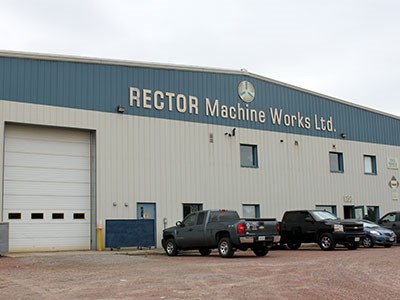Change is nothing new for Rector Machine Works. Since opening its doors in 1934, the family-run machine shop has expanded and moved multiple times. But its most recent expansion will allow the shop to service customers on a new scale and expand its market share.
This summer, at a cost of $2 million, 5,000 square feet were added to the Sault Ste. Marie shop, along with two more CNC machines and a large plasma table. Dave Rector, sales team leader and the grandson of the shop’s founders, Hervey and Loretta Rector, said the cramped quarters had previously made it impossible to add new equipment to the mix.
“We had our machines all crammed into the space; it filled up fast,” he said. “We needed it. We couldn’t fit any more in.”
The shop now has five CNC machines and a plasma cutter to serve clients in the steel, forestry, mining, pulp and paper, and power-generation industries. Rector’s services include machining, welding and fabrication, driveline and balance maintenance, millwrighting, and hydraulics and metal sales.
Though the expansion is smaller than originally planned, Rector said the smaller CNC machines will allow the shop to take on more delicate jobs, filling a niche that had been underserviced.
“For our customers, we do a lot of smaller runs,” Rector said. “What we wanted to do with our bigger machines was not to tie up the bigger machines with smaller jobs. So, we can run the bigger jobs now. These increase our efficiency by about 12 to 15 per cent.”
Rector used to send larger jobs out to flame-cut houses in southern Ontario, but after doing the math, realized that, by purchasing its own machine, it could do the work itself and earn back its money in a year. Though years ago it was a bonus if a shop had a plasma cutter, today it’s almost a necessity to keep up with demand, Rector said.
Being open to change has helped Rector remain competitive despite the ups and downs of the sectors it serves. When the steel industry tanked in the 1980s, the shop branched out into millwrighting, specifically for the forestry sector. When forestry took a dive, Rector moved into mining with recommendations from its former clients in forestry.
Rector has earned a solid reputation for its work across industries.
“Every time there’s a downturn we diversify and try to get into something else,” Rector said.
Through it all, Rector has maintained a solid core of employees, which currently number 40, and many have been with the shop for 10 years or more. Hervey Rector Jr., whose father founded the business, said it’s important to him to provide solid, good-paying jobs to the employees.
And that was a leading reason for the expansion. Continuing to evolve and diversify gives Rector the competitive edge it needs to continue serving clients, while providing for those who rely on the shop for their livelihood.
“That’s why we are here: to provide jobs for our employees and our families,” Hervey Jr. said. “That’s our job as employers.”
That ideology guided the company through the last recession when it decided to weather the storm with its staff largely intact. Because it’s so difficult to find skilled employees, Hervey Jr. said, it was more economical to keep them on staff and try to find other industries to tap into.
The company’s approach to business has paid off, allowing it to keep not just bodies, but quality people, on its roster, doing quality work.
As Hervey Jr. said, “It takes a long time to build up your reputation, but it only takes one job to tear it down.”




